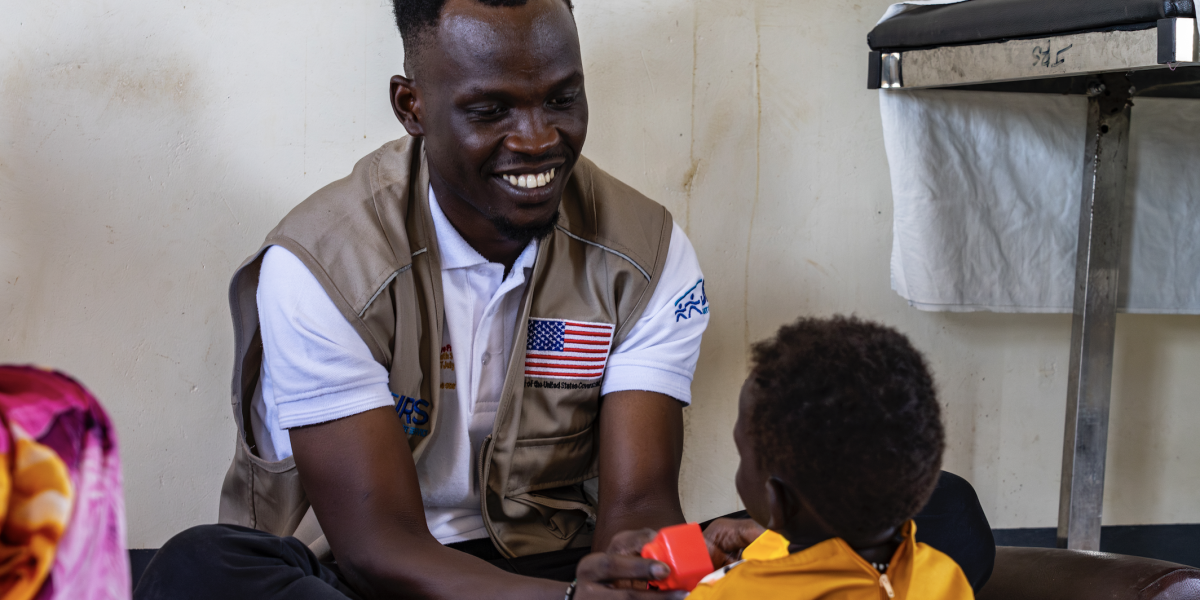JRS South Sudan & PRM: Disability Services Defying Odds and Breaking Down Barriers
08 December 2023|Chloe Gunther

In a refugee camp in Maban, South Sudan, a mother tried to soothe her crying baby, who was suffering from hydrocephalus, a neurological disorder. But with scarce medical resources and no access to a hospital, the mother was left with few options. That’s when she reached out to the JRS Maban Rehabilitation Center.
Winnie Nandwa has served as an Occupational Therapist with the JRS Maban team since 2020. She, along with two physiotherapists, an intern, an Inclusive Education officer, and volunteers, have developed a holistic approach to support children with disabilities. When the mother came to Winnie and her team, they referred her to a hospital in Kampala, Uganda. There, the child underwent surgery alleviating the pressure on their young brain.
“The mother was incredibly grateful when they returned from Kampala,” Winnie said. The program’s success is propelled by funding from the United States Department of State: Bureau of Population, Refugee, and Migration (PRM), a vital partner supporting JRS programs worldwide.
Initially, the program began as a daycare facility, fostering a space for children with disabilities. “We are the only program in Maban supporting those with disabilities,” Winnie said. “Where we are now is so different than when we started. We’ve grown, improved, and discrimination has decreased.”
The program’s success transcended expectations. Children were able to transition from the center to formal schooling after working with the JRS team. Today the daycare officially stands as a recognized Rehabilitation Center.
Throughout the four refugee camps in Maban, JRS has developed a system that can accompany children in each location. JRS Maban opened its first Rehabilitation Center in the Doro Refugee Camp in 2019. In 2021, JRS opened another location, between two refugee camps, so that children from both can attend.
Realizing the challenges faced by those in the Kaya Refugee Camp, which is about an hour away from the closest center, JRS implemented a home-visiting program. On Mondays, Tuesdays, and Thursdays the Maban team works in each of the three centers. On Wednesdays and Fridays, they conduct home visits. This year alone, 386 clients have improved their functional independence and graduated from the program.
At the centers, the atmosphere is warm and welcoming. The children are greeted with hot tea and bread to eat. “We try to make it more homey,” Winnie said, “otherwise all the medical equipment makes it look too much like a hospital.”
Beyond physical disability, the JRS Maban team extends support to children with learning difficulties. Through playing, reading, and writing activities, occupational therapists help improve cognitive skills. They strive to create an inclusive and nurturing educational environment by recognizing each child’s unique talents, needs, and challenges. “What inspires me is seeing the children meet their goals…it is really worth it, seeing the children able to attend school,” Winnie said.
These initiatives not only improve the children’s well-being but also help reshape the community’s attitude towards disabilities. “In a culture that still sees disabilities as a sort of curse on the family, we hold workshops to help break down this stigma,” Winnie said. Caretakers understand more of the medical circumstances faced by the children under their supervision as well as the tangible successes. From seeing children walk to seeing them thrive in the classroom, hearts and perceptions are rapidly changing.
With the few centers in operation and limited staff capacity, the JRS Maban team has adapted by providing children and caretakers with exercises they can do at home. Most children only visit the centers twice a month and then the team supplies them with exercises to practice with their caretakers at home.
Caretakers, shouldering immense responsibility, can find solace and companionship in support groups facilitated by JRS. They share success stories, engage in discussions about how to better support their children, and talk through the emotional experience of taking care of someone with a disability. JRS staff conducted a survey and found that 78% of participating caregivers described an improved sense of safety and well-being for their children after the program.
As the program continues gaining momentum, adults with disabilities have begun seeking assistance, encouraged by the decrease in stigma and increase in success stories. Walk-in sessions in the Rehabilitation Center provide a small space for support, with the team currently exploring additional opportunities to meet the community’s needs.
The collaboration between JRS and PRM has been instrumental for the program’s success. Winnie envisions a future with increased advocacy around disability services and additional support and resources for adults with disabilities to continue improving their holistic approach. This story of transformation, hope, and resilience in Maban has only just begun.



